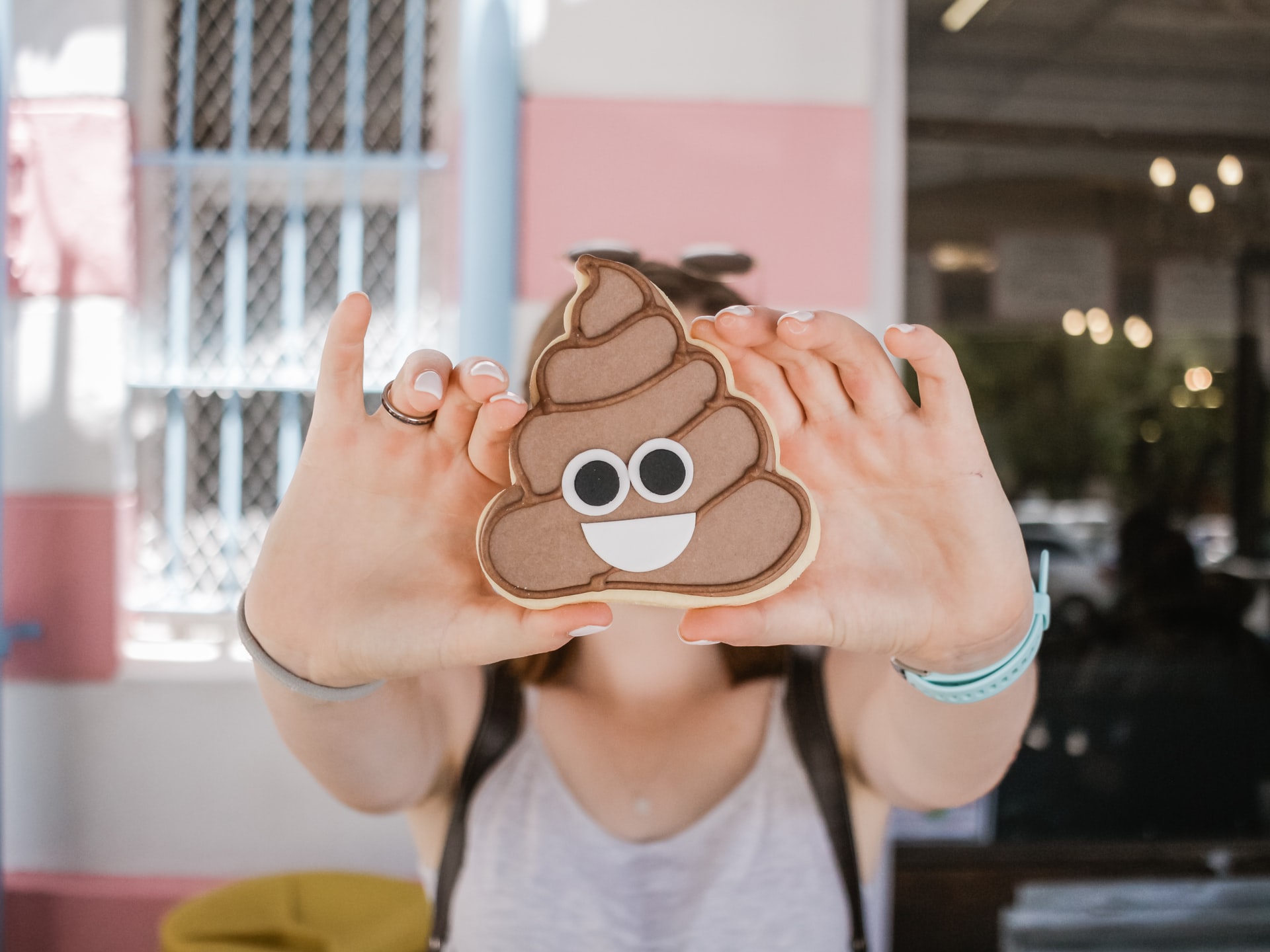I’m about to get really personal here. Today I want to talk about poop, constipation, and probiotics. I’m letting you know now so you can click away or read on like you’re watching a slow-motion train wreck. You simultaneously want to know yet don’t want to know what’s going to happen.
A Life of Constipation
From the time I was a baby, I’ve suffered from constipation. Were you to ask my mother, she’d tell you of a time as a wailing infant when I passed a stool the size of which caused her to wonder how it came out of me?
I warned you – this was going to be a TMI piece.
This affliction did not improve with age. As a picky eating teenager, vegetables and fiber-filled foods that would have helped were not on my menu. Fried foods, fast foods, milk, and alcohol were diet staples, thus not conducive to helping my situation.
Gradually I matured, but I didn’t start to like, let alone regularly cook or eat vegetables until I was in my mid to late 40s and early 50s. Other than oatmeal or some other kinds of fiber-filled grains, I’m not a fan of whole wheat anything either. This meant that my diet was never going to be the way I cured my constipation.
Constipation is painful. After a few days of not moving my bowels, I become lethargic, bloated, and terribly uncomfortable. Nausea sets in because nothing is moving. When my body wants to expel something but can’t, stomach cramps are like daggers in my abdomen, and passing a granite-like stool is wrenching.
I’ve learned more about health and fitness in the last 4 years than in the last 40 years, and that includes how to better manage my constipation, even without eating handfuls of wheat germ. This is when I was introduced to and started taking probiotics.
The Holy Grail of Probiotics
Over the years, I’d sporadically tried other means and methods to relieve my constipation. Psyllium husk, chalking laxatives, and stool softeners filled my medicine chest and emptied my wallet. I was not too fond of the taste of the psyllium, and the laxatives were not much better. The stool softeners were unpredictable and more than once put me in uncomfortable situations where I needed a bathroom stat. Plus, they all left me feeling more bloated than I already was.
It was a trip to my gynecologist for a raging yeast infection (ahem – a reminder that this is a TMI article) that taking a daily probiotic supplement to regulate my pH balance down there was mentioned. Over-the-counter creams, ointments, and suppositories that typically clear yeast infections are messy and often take days to work. I was happy to try a pill if it meant prevention and relief from the horrible itching caused by yeast infections.
If you’ve read any of my articles or even the About Me page of my blog site, you’ll see that I was a late bloomer. By that, I mean that it wasn’t until I hit my 50s that I began to learn more about nutrition and really pay attention to what my body needed to function at its best. So, it wasn’t then that I began taking any supplements daily. However, the probiotics happily made it into the mix and the other vitamins and minerals I chose to reduce inflammation, treat my asthma, improve bone health, and strengthen my immunity.
I can’t say that there is one branded probiotic supplement that I use regularly. What I do look for, however, is something that has live cultures in the billions (20, 50, or 100). I’ve tried those supplements that have only 100 million live cultures, and that billion mark seems to work better for me. If you have a neighborhood Walgreens, they often run BOGO specials on vitamins, minerals, and supplements. It’s a great time to try a probiotic or stock up on your other supplements.
My Morning Poop Routine
My pulmonologist recommends that I take the medicines I need to control my asthma at night. As such, I take all my supplements, to include my probiotic at night with a small glass of chocolate milk. The chocolate milk isn’t for dietary reasons; it’s a treat that helps curb my chocolate craving and coats the handful of pills I take in one swallow.
My morning routine doesn’t vary. I’m up at 4:15 or 4:30 am; I have a cup of coffee and do some reading, writing, or studying. Depending on the weather or day of the week, I’ll go for a walk or hit the gym. Somewhere after coffee and before my walk or trip to the gym, my probiotic works its magic. No fuss, no muss, no strain.
If I forget to take my nightly handful of medicines, two things happen: I wake up in the middle of the night in a full-blown allergy attack from not having taken my asthma medicines, and my morning poop does not happen. Constipation starts there. For me, there is a definite 1:1 correlation.
Do Probiotics Really Work?
If two or more days go by without taking a probiotic, my gut health suffers. I am no longer regular, I begin to bloat, and acid reflux creeps back. And I get cranky. I’m that suffering baby all over again.
Several studies agree that taking probiotics regularly does help maintain a healthy gut. After all, gut health itself is related to a whole host of inflammation-related illnesses that can lead to metabolic syndrome.
However, when it comes to saying if probiotics help constipation specifically, the studies vary. There is evidence that probiotics help protect your gut from the harsh side effects of antibiotics and provide some intermittent relief of the effects of Irritable Bowel Syndrome (IBS), such as abdominal pain and bloating, diarrhea, and surprise – constipation.
For me, the evidence of whether probiotics work or not is there. When I take it, I stay regular, and acid reflux isn’t a thing. When I don’t, I am not. Simple as that. Your mileage may vary.
Final Words
From someone who discounted the benefits of taking regular supplements, I’ve become a believer. Not because of the hype of Facebook ads or media articles that cherry-pick and sensationalize tidbits of scientific studies for ratings. But rather because they have worked for me. As my own lab experiments, I consistently see the benefits and drawbacks of taking a probiotic supplement regularly to aid in constipation and help me poop.
Frankly, that’s all the proof I need.

